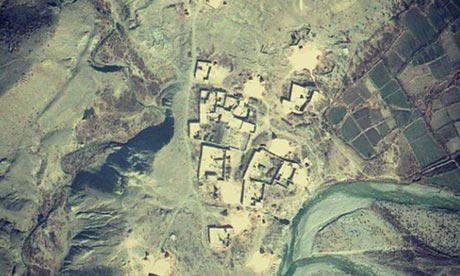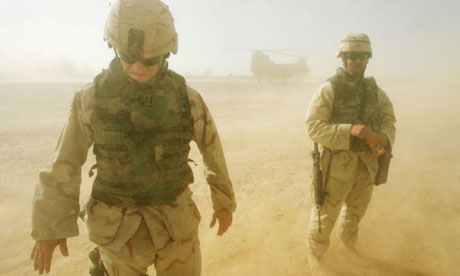
Chaos. Flames. Corpses. Then, a second missile struck.
Within seconds, 11 of the passengers were dead, including a woman and her 7-year-old daughter. A 12-year-old boy also perished that day, and another man later died from his wounds.

Chaos. Flames. Corpses. Then, a second missile struck.
Within seconds, 11 of the passengers were dead, including a woman and her 7-year-old daughter. A 12-year-old boy also perished that day, and another man later died from his wounds.
 The U.S. military has detained more than 200 Afghan teenagers who were captured in the war for about a year at a time at a military prison next to Bagram Airfield in Afghanistan, the United States has told the United Nations.
The U.S. military has detained more than 200 Afghan teenagers who were captured in the war for about a year at a time at a military prison next to Bagram Airfield in Afghanistan, the United States has told the United Nations.
The U.S. State Department characterized the detainees held since 2008 as "enemy combatants" in a report sent every four years to the United Nations in Geneva updating U.S. compliance with the U.N. Convention on the Rights of the Child.
 The Obama administration has ordered significant cutbacks in initial plans for a robust U.S. civilian presence in Afghanistan after U.S. combat troops withdraw two years from now, according to U.S. officials.
The Obama administration has ordered significant cutbacks in initial plans for a robust U.S. civilian presence in Afghanistan after U.S. combat troops withdraw two years from now, according to U.S. officials.
Learning from Iraq, where postwar ambitions proved unsustainable, the White House and top State Department officials are confronting whether the United States needs — and can protect — a large diplomatic compound in Kabul, four consulates around the country and other civilian outposts to oversee aid projects and monitor Afghanistan’s political pulse.
Taliban insurgents, including several suicide bombers, attacked a U.S.-Afghan military airfield in the eastern city of Jalalabad early Sunday morning, triggering an hours-long battle that left most of the attackers dead in a failed attempt to breach the base’s fortifications.
The attackers detonated two suicide vehicles at the gate of the base, followed by three more suicide bombers on foot who detonated explosive vests, according to an account of the attack provided by the Nangahar provincial governor's office late Sunday afternoon.
Facing the possibility that President Obama might not win a second term, his administration accelerated work in the weeks before the election to develop explicit rules for the targeted killing of terrorists by unmanned drones, so that a new president would inherit clear standards and procedures, according to two administration officials.
The matter may have lost some urgency after Nov. 6. But with more than 300 drone strikes and some 2,500 people killed by the Central Intelligence Agency and the military since Mr. Obama first took office, the administration is still pushing to make the rules formal and resolve internal uncertainty and disagreement about exactly when lethal action is justified.
 The military is normally only too pleased to herald its successes, and to praise the courage of the men and women who put their lives on the line for their country. Perhaps it is the link (or lack of it) between these two that encourages them to talk-up certain missions, and come over all sheepish when it comes to drones.
The military is normally only too pleased to herald its successes, and to praise the courage of the men and women who put their lives on the line for their country. Perhaps it is the link (or lack of it) between these two that encourages them to talk-up certain missions, and come over all sheepish when it comes to drones.
Piloted by remote control from thousands of miles away, Unmanned Aerial Vehicles (UAVs) have been the one unqualified military triumph of the war in Afghanistan. That is, if "success" comes in an equation where lots of people get killed, at next to no risk, at an affordable price.
 A jury has ordered an $85m (£53m) compensation payout by the American military contractor Kellogg Brown and Root – which helped build Guantánamo Bay and has tendered to run key police services in Britain – after finding it guilty of negligence for illnesses suffered by a dozen soldiers who guarded an oilfield water plant during the Iraq war.
A jury has ordered an $85m (£53m) compensation payout by the American military contractor Kellogg Brown and Root – which helped build Guantánamo Bay and has tendered to run key police services in Britain – after finding it guilty of negligence for illnesses suffered by a dozen soldiers who guarded an oilfield water plant during the Iraq war.
After a three-week trial the jury deliberated for two days before reaching a decision against KBR, which used to be part of Halliburton corporation. KBR was ordered to pay $6.2m to each of the soldiers in punitive damages and $850,000 in non-economic damages.
Page 12 of 114